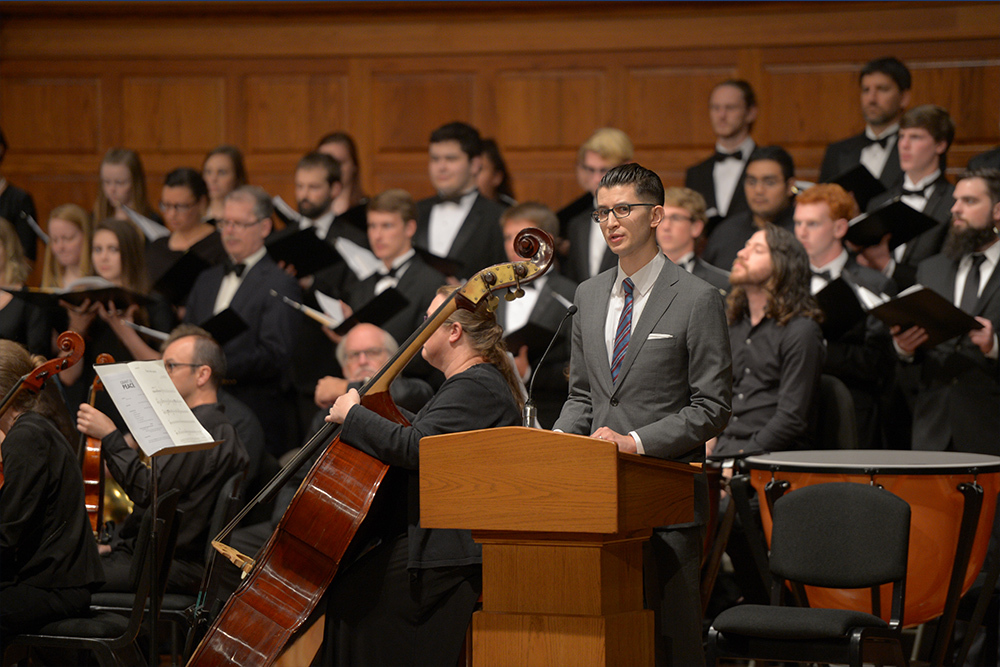Donovan Tann is a 2008 graduate of Eastern Mennonite University who now teaches courses in literature, writing and film at Hesston (Kansas) College. A member of the Lilly Graduate Fellows Program’s first cohort, he earned his English PhD at Temple University in Philadelphia.
What has been your post-EMU studies and/or career path?
After finishing my English degree at EMU, I entered an English PhD program at Temple University and studied early modern English literature while teaching both literature and writing courses. During my graduate program, I was a member of the first cohort of the Lilly Graduate Fellows Program, a selective three-year program that provides mentorship, support and colloquia for graduate students interested in the intersection of faith and scholarship. After completing my PhD, I began teaching at Hesston College.
How did your academic studies and professors at EMU prepare and inspire you for your graduate studies and/or current work?
Being able to have a faculty member as my advisor at EMU helped me to select coursework that interested me and which has contributed to my scholarship in unusual ways. I might not have taken as much interest in religion’s role in the early modern world without my introduction to theology course. I also had the flexibility to take senior English seminars in both French postmodern literature and transatlantic modernism, and these courses helped to prepare me for graduate school and to develop my voice as a literary scholar.
The mentorship that I received as a student, both formally through the honors program and informally within the language arts department, was crucial to my decision to pursue graduate study. I developed important intellectual virtues of critical thinking and reflection with my honors cohort, and I was honored to share an informal weekly lunch with Jay B. Landis in my last years at EMU. I’m immensely grateful for the way that my professors invested in me as a person and future teacher-scholar.
How did your extra-curricular activities at EMU prepare and inspire you for your graduate studies and/or current work?
One of the ways that Eastern Mennonite University helped to make my education affordable was through a campus job. My work in the library and at the reference desk in particular fostered the skills I needed to be a better researcher and gave me a clearer understanding of what an academic library can do for students and the campus community.
What about your experience at EMU has made you distinctive when applying to graduate school or jobs?
Over the years, the positive experiences I had as an EMU student have been an excellent resource for my own teaching practice. When I began teaching as a graduate student, I often found myself returning to the kinds of discussion-focused and student-centered teaching techniques that I saw modeled during my time as an EMU undergraduate. This repository of ideas helped me to be more comfortable and successful in my transition from college student to graduate instructor and finally to college professor.
Similarly, the kind of critical thinking and interdisciplinary openness that my professors modeled helped to prepare me for the kind of inquiry and research that I would go on to do in graduate school. Because EMU is a member of the Lilly Fellows Program Network, my advisor – Professor Marti Eads – helped me to apply for a fellowship program that provided financial support and mentorship that helped me to navigate graduate school more effectively.
What attracted you to attend EMU as an undergraduate?
When I was looking for colleges, I was interested in a place where I could work closely with my professors in small classes and where I could explore a variety of different academic areas as an undergraduate. The EMU honors program was particularly exciting to me because of the way it challenged me to grow as a student and as a person.
What are some favorite memories of your time at EMU?
One of my highlights was studying in Guatemala and Nicaragua as my cross-cultural semester. This kind of learning was completely different from the setting and classes that I had taken before, and I know that what I gained through language and cultural study has continued to shape my perspective as a teacher/scholar. Our leaders, Ann and Jim Hershberger, were outstanding academic, personal and spiritual guides for our whole group.
